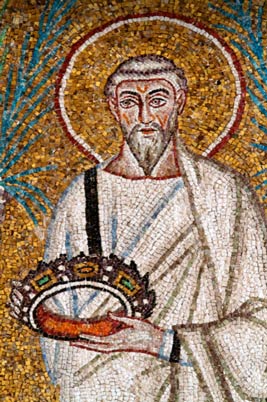Feast Day: February 23rd
Polycarp was fond of telling stories about his teacher. One tale stands the test of time and brings a smile to my face as I tell it here: on the famous day his teacher entered the bathhouse in Ephesus only to explode forth a few seconds later – no bath having been accomplished – “let us fly” he exclaimed, “lest even the bath-house fall down, because Cerinthus, the enemy of the truth, is within.” [Ireneaus, Adversus Haereses, bkIII.ch3.p4] Polycarp’s mentor had good reason to flee. Cerinthus professed, and proclaimed, a whole hodgepodge of beliefs he had drawn from Judaism, Christianity, Gnosticism, and the many other philosophies that were passed around in those days – a perfectly human reaction to the costly decision to risk one’s intellect by surrendering to real faith – but one that meant he was toxic to those who professed the Christian faith. Cerinthus claimed that Jesus was not divine, that God did not really create the world, that St. Paul was an apostate, and the Jewish Law was still required.
The man who catapulted out of that bathhouse was St. John the Evangelist. The “disciple who Jesus loved”, the man who saw with his own eyes the transformation of water into wine, the magic catch of fish, the multiplication of the loaves, the transfiguration and agony in the garden. This disciple, who had laid his head upon Jesus’ heart at the Last Supper and heard the heartbeat of God, and had seen that same heart pierced, and His blood pouring down the cross, would not remain in the presence of someone who denied his Savior’s divinity. “God so loved the world that He gave His only begotten Son”, this apostle had penned, and he would not even remain across the room from someone who flagrantly rejected that truth.
Who of us has as great of faith as St. John the Apostle? Yet do I flee the mixed half-truths and underminings of our faith that are even more prevalent in our world as he did from that bathhouse? St. Polycarp sat at the feet of John. He saw the love and faith of the now-old apostle as John preached the Love of God, and Polycarp remembered that this staunch, bent, weather-beaten man – his life completely transformed by Jesus’ call to “come follow me and I will make you a fisher of men” – with a faith uncrushable by the might of Roman torture, yet who had scattered from the presence of one who blasphemed His Lord.

Irenaeus, in the next generation of Christian saints, points his own readers back to Polycarp: “There is also a very powerful Epistle of Polycarp written to the Philippians, from which those who choose to do so, and are anxious about their salvation, can learn the character of his faith, and the preaching of the truth.” [Ireneaus, Adversus Haereses, bkIII.ch3.p4]. What great truths do we find in this letter, one of the earliest that we have just decades after the Gospels were written and Paul crisscrossed the Mediterranean? He recalls the words of his friend, St. John, “For whosoever does not confess that Jesus Christ has come in the flesh, is antichrist” [1 John 4:3] and continues:
and whosoever does not confess the testimony of the cross, is of the devil; and whosoever perverts the oracles of the Lord to his own lusts, and says that there is neither a resurrection nor a judgment, he is the first-born of Satan. Wherefore, forsaking the vanity of many, and their false doctrines, let us return to the word which has been handed down to us … “watching unto prayer” [1 Peter 4:7] and persevering in fasting; beseeching in our supplications the all-seeing God not to “lead us into temptation.” [Matthew 6:13]. [St. Polycarp, Epistle to the Philippians, ch7]
Perhaps we should take his teaching to heart as we flee the occasions of sin and falsehood in our own lives? Is this the saintly invitation to turn away from profane words and conversations this Lent?
– Fr. Dominic Rankin continues to blast through audio books at a rate of one every 2 or 3 days. With St. Polycarp’s words on his mind, he is going to be more discerning about whether the books are bringing him closer to God, or not. Popular is not the same as good, beautiful, true, or godly.